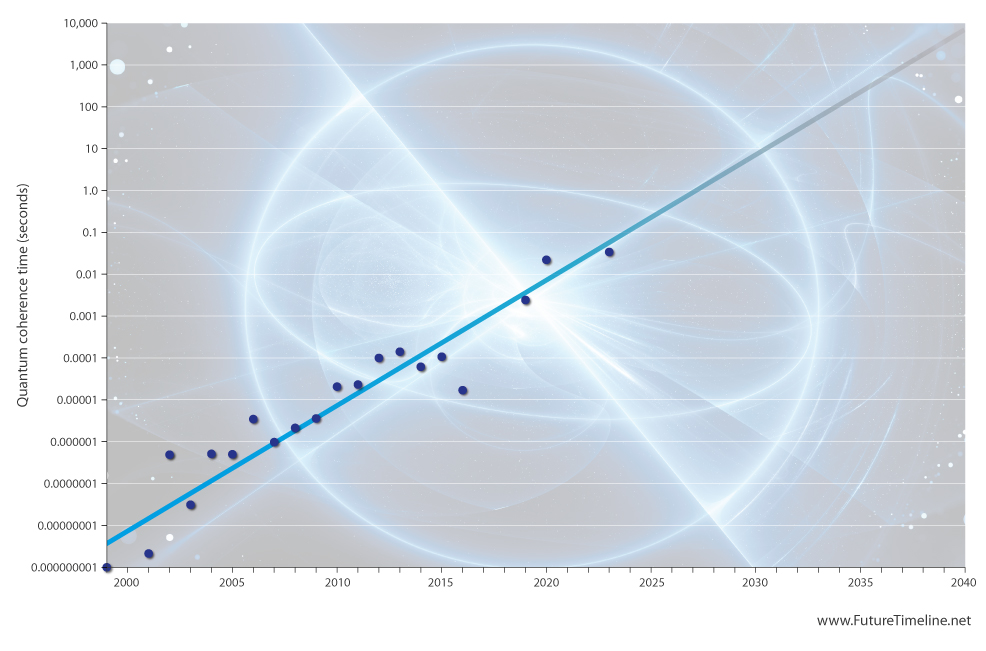
Quantum coherence times, 2000-2040 Coherence times in quantum computing have increased by orders of magnitude since the early 2000s. If this exponential progress continues, coherence times measured in seconds or even minutes could be achieved in the near future. When discussing the latest quantum computers, most people tend to focus on the number of quantum bits (or qubits) in a system. However, while qubit counts are a very important factor, another key metric is coherence time, which measures how long a qubit can hold information. In order to generate complex mathematical calculations, a qubit needs to hold information for as long as possible. That requires physical qubits to remain highly isolated from the surrounding environment. When a qubit is disrupted by external stimuli – such as background noise from vibrations, temperature changes or stray electromagnetic fields – information about the state of that qubit "leaks out" in a process known as decoherence. This can ruin the ability to exploit any quantum effects. Longer coherence times enable more quantum gates to be utilised before this occurs, resulting in more complex calculations. In the late 1990s and early 2000s, quantum computing systems had limited coherence times, measured only in nanoseconds. Since then, orders of magnitude improvements have been achieved, alongside falling error rates. Advances have occurred in several areas – including materials, better shielding, and the introduction of 3D architectures. Some of the major leaps in coherence times have been the result of new qubit designs such as transmon and fluxonium qubits. In the graph below are coherence times for notable studies of the last 25 years, the most recent being a time of 34 milliseconds. A future trend line is also projected to 2040. Based on this rate of progress, it appears feasible that a quantum computer will achieve coherence of one second or more before the end of this decade. Assuming that trend continues, we could see 10, 100, or even 1,000 seconds during the 2030s. A major milestone will be the cracking of RSA-2048 encryption keys (among the world's most secure algorithms), which a quantum computer with 4,100 stable qubits could achieve in 10 seconds. That same task would take a classical computer around 300 trillion years.
Sources: "This model predicts that proof-of-concept FTQL will be developed between early 2026 and early 2033 with 90% confidence with the median in early 2030, and that RSA-2048 Shor attacks will become feasible between mid 2039 and mid 2058. [...] 22.7% of the experts they surveyed think it is likely or highly likely that quantum computers will be able to crack RSA-2048 keys by 2030, and 50% think that is likely or highly likely that we will be able to crack RSA-2048 keys by 2035." Natural and artificial atoms for quantum computation, Iulia Buluta, Sahel Ashhab, Franco Nori: [...] One of the company's results was the use of a "three-dimensional" superconducting qubit, or 3D qubit (pictured), to extend the amount of time that qubits retain their quantum states up to 100 microseconds, two to four times better than previously reported records. Suppressing Charge Noise Decoherence in Superconducting Charge Qubits, J. A. Schreier, et al.: Thermal and Residual Excited-State Population in a 3D Transmon Qubit, X. Y. Jin, et al., Physical Review Letters: Ultra-long coherence times amongst room-temperature solid-state spins, E. D. Herbschleb, et al., Nature Communications: New record length for quantum coherence, Future Timeline Blog:
Posted: 1st December 2020. Last updated: 18th September 2023.
If you enjoy our content, please consider sharing it:
|







